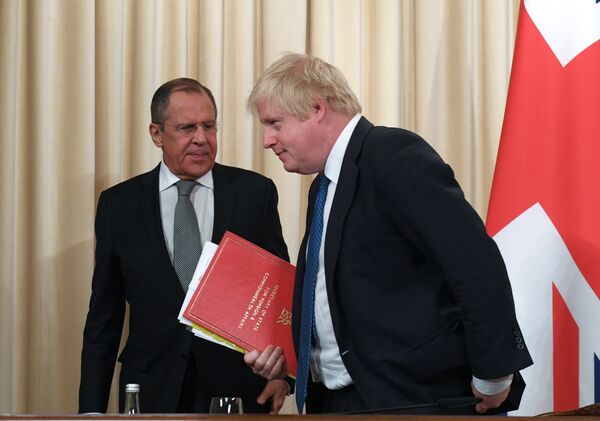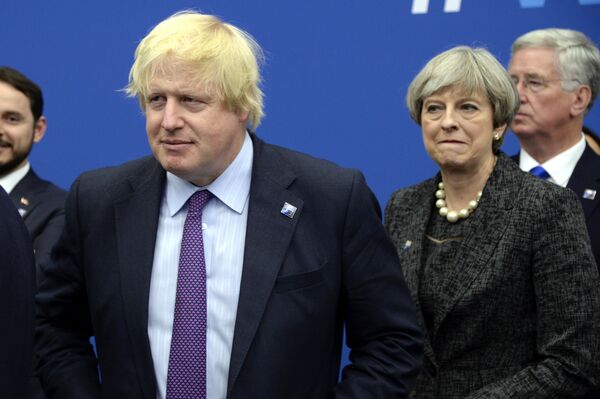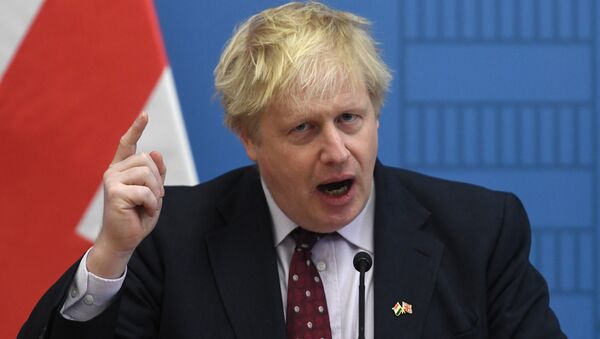Since he assumed the position of Britain's top diplomat in July 2016 and even before that, when he was still mayor of London, Mr. Johnson has issued a number of statements assessing Russia's relations with the Syrian leadership and Russia's role in the region.
The latest manifestation of Johnson's estimation came on May 10 when he called on Russia to sway its influence in Syria and "press" its partners to "work towards a broader political settlement."
Strongly condemn Iranian rocket attack against Israeli forces. Fully support Israel’s right to defend itself. Urge Iran to refrain from further escalation. Crucial to avoid increased instability in the region https://t.co/bAdmiDACbV
— Boris Johnson (@BorisJohnson) May 10, 2018
His comments come following launch of Israeli strikes on Iranian targets in Syria. The attack, according to Israel, was a response to rockets allegedly fired by Iranian forces.
"We also continue to call on Russia to use its influence to press those in Syria to cease their destabilizing activity and work towards a broader political settlement," Johnson said.
His comments echoed a statement Johnson made in 2016, when he highlighted Russia's crucial role in the region, saying "Russia has a unique opportunity to persuade the Syrian regime to end" what he viewed as "destructive military approach."
Resumption of airstrikes on #Aleppo increases civilian suffering. #Russia has unique chance to persuade #Syria regime to end bloodshed.
— Boris Johnson (@BorisJohnson) November 15, 2016
READ MORE: Johnson Urges Russia to Push Sides to Syrian Conflict to End 'Destabilization'
Last month Johnson was quizzed on the British-Russian relations following the airstrikes launched by UK, US and France in Syria on April 14, 2018. He responded saying Britain doesn't seek worsening of relations with Moscow "any more than we relish carrying out the strikes in Syria yesterday."
"We want to engage with Russia, but I'm afraid the Russians give us every possible signal and evidence that we have to beware of them."
In his turn the Russian Foreign Minister Sergei Lavrov pointed out at the same time that "Boris Johnson, or our (British) partners don't want to listen to or even hear us."

How Things Were
In 2015 the then London mayor, Boris Johnson addressed Britain's relationship with Russia when it comes to Syria in a news article titled "Let's deal with the Devil: we should work with Vladimir Putin and Bashar al-Assad in Syria."
Last Xmas:
— George Galloway (@georgegalloway) December 13, 2016
Let’s deal with the Devil: we should work with Vladimir Putin and Bashar al-Assad in Syria — Telegraph https://t.co/LrRDGUpjdD
He argued that it was time to "set aside our Cold War mindset" and recalled the sentiment of the French, following his visit to Paris.
"Many French people think the time has come to do a deal with their new friends the Russians — and I think that they are broadly right."
He then admitted that he is "no particular fan of Vlad" but stressed the value of Russia's role in defeating Daesh in Syria.
"With Russian air support, the Assad regime is only a few miles from Palmyra — the fabled pink-stoned city of monuments, where Isil decapitated the 82-year-old curator, Khaled Al‑Assad, before beginning an orgy of cultural destruction. Am I backing the Assad regime, and the Russians, in their joint enterprise to recapture that amazing site? You bet I am. That does not mean I trust Putin, and it does not mean that I want to keep Assad in power indefinitely. But we cannot suck and blow at once," Johnson wrote.
How Things Changed
A promotion to the Cabinet later, Mr. Johnson's rhetoric has changed drastically in April 2017. Now the UK Foreign Minister, he intensified his criticism of Russia, accusing the Russian president, Vladimir Putin, of being a "lifeline for the murderous Syrian regime."
I will now not travel to Moscow on Monday 10 April. My priority is talks w/ my #G7 counterparts about Syria and Russia's support for #Assad
— Boris Johnson (@BorisJohnson) April 8, 2017
Russia's backing for #Assad main focus of talks just now w/ US Sec of State Rex #Tillerson ahead of mtg w/ #G7 counterparts in Lucca, Italy pic.twitter.com/Fhh0D0YpkC
— Boris Johnson (@BorisJohnson) April 10, 2017
Johnson's harsh words followed his failure to win backing from other G7 nations for further economic sanctions on Russia after it blocked a UN resolution pertaining to the alleged use of chemical weapons in Syria.
The British FM said Russia faces a choice of continuing to act "as a lifeline for Assad's murderous regime, or it could live up to its responsibilities as a global power, and use its influence over the regime to bring six long years of failed ceasefires and false dawns to an end".

Throughout his term as Britain's Foreign Minister, Boris Johnson has faced calls for resignations on numerous occasions.
READ MORE: A Breacher, a Novice and a Liar Walk Into a British Government…


